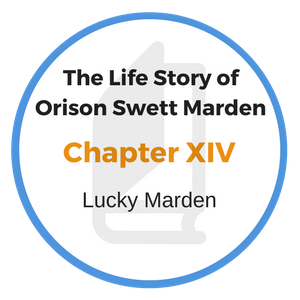- Home
- Self Growth Library
- Orison Swett Marden Chapter XI
Orison Swett Marden Chapter XI
The Struggle For An Education
The Life Story of Orison Swett Marden Chapter XI:
The morning of Orison's departure dawned clear and bright, with a stimulating freshness in the mountain air.
Dressed in his best suit — a coarse woolen shirt, a shabby coat and trousers, and a pair of cowhide boots, — behold him setting out for Colby Academy, some fifty miles away.
When he arrived at his destination the simple, country-bred youth was bewildered at all he saw and heard.
"That being my first exit from the wilderness," he said, "I was surprised to find how many well-dressed boys and girls there were at the Academy, many of them from cities, and all infinitely further advanced in their studies than I was. Up to that time I had not begun to realize that I was such an ignoramus, not having even a decent common school education. In fact, I was so far behind all the others that I was ashamed to start in where I belonged, which was pretty far back in a district school.”
This made trouble for him later. But he was so much larger than the young boys and girls with whom he really belonged that he took chances on going into a class that was too advanced for him. Naturally very bashful, he was acutely conscious that his uncouth clothes, together with his unusual height, made him a conspicuous figure among his classmates.
This added greatly to his embarrassment and awkwardness, thus increasing the difficulties of his situation.
He had hoped by way of extra study to catch up with his class. But the odds against him were too great and, as time went on, he was disappointed to find that in spite of his strenuous efforts he was not making much headway.
Realizing his backwardness even more fully than before, he wrote to his guardian, asking permission to remain another term at the Academy. His request met with a prompt refusal. Mr. Fifield not only told him that he must return home and go to work, but that if he should attempt to remain at school he would "post" him in the local papers. That is, he would notify the public that he would not be responsible for any bills his ward might incur.
Young Marden, determined to get an education, promised that he would not call on him for a dollar to pay his expenses. But apparently this did not alter Fifield's decision, for, at the end of the term, his ward did not dare to return to his home, fearing that he would not be allowed to go back to school.
In his dilemma he decided he would go to see General Luther McCutchins. He had heard him favorably mentioned for his kindness to boys working their way through school. To the General he went, and told him his story. The General was deeply interested and immediately wrote to Mr. Fifield, requesting him to allow Orison to continue at Colby Academy, if he could manage to get along without any financial aid from him. His appeal evidently had some effect, for, although Fifield resented the interference of an outsider in his affairs, he offered no further opposition to his ward's plans and left him to his own resources.
During the summer vacation Orison worked for General McCutchins, earning twenty dollars, which seemed a very great sum to him. He also took care of a barn, and did some kitchen work in a boarding house, thus earning his board, so that, when the fall term opened, he was able to go back and resume his studies.
"There is no medicine like hope, no incentive so great, and no tonic so powerful as expectation of something tomorrow."
This initial success in his struggle for higher education greatly strengthened and encouraged the ambitious student. The sense of his individuality was growing stronger. The feeling of personal responsibility was developing that consciousness of inward power which, later, he so insistently stressed in his writings.
"You will be amazed," he said, "to find how, the moment you cut off all outside assistance, you will be reinforced by a new power which you never before dreamed you possessed. But it will never come to your aid until you stop leaning and depending, — until you throw away all crutches and stand erect on your own feet."
Although still legally a minor, subject to his guardian's control, he was deciding things for himself, and mapping out his course along his own lines. He had thrown away all crutches and was standing on his feet, alone. He secured odd jobs around the Academy, doing chores, sawing wood, milking cows, waiting upon the students' tables and washing dishes. At times he would get a chance to saw cord wood in the forest some distance from the Academy. In various ways he thus earned his tuition, board and lodging — the latter in a little attic room.
It was uphill work, and with the time spent in the classroom, there was no leisure during the day to make up the deficiencies in his classes hanging over his head from the previous term. Consequently, he spent many hours studying far into the night by the light of a kerosene lamp. However, he was happy, for at last he felt that he was beginning to amount to something.
"I managed to push ahead," he says, "and continually when reading and in my odd leisure moments, I was thinking of, and working on my dream book, adding new material to my notebook from every possible source. The motto I had printed on the opening page of this first notebook had a great fascination for me, and every night before going to bed I would turn to it and read it over and over again: 'Let every occasion be a great occasion, for you cannot tell when fate may be taking your measure for a larger place.'
This kept my ideal constantly before me, and, in some mysterious way which I did not then understand, the repetition of the words renewed my courage and strengthened my resolution some day to make my dream book a reality. With this thought in mind, I always carried a small notebook in my pocket, lest some stray suggestion or idea for the book would get away from me.
On Wednesday and Saturday afternoons, when the Academy library was open, I searched eagerly for books which I thought would help me along the line of my ambition."
After working his way in this manner through two or three terms, he decided to leave the Academy. His eyes were beginning to give him serious trouble, and he found that his night study must be given up, at least for a time. Besides, the constant hard work, with the added mental strain of trying to catch up with his classmates, proved too much for his physical endurance.
"No man is beaten until his hope is annihilated, his confidence gone, As long as a man faces life hopefully, confidently, triumphantly, he is not a failure; he is not beaten until he turns his back on life."
- Orison Swett Marden
Orison Swett Marden Chapter XI , continued...
If he had entered on equal terms with his classmates it would not have been so bad, for he would have had only to keep abreast of the lessons from day to day. But the effort to do this, while at the same time trying to make good in the subjects in which he was deficient — which meant every one in the class curriculum — was too much even for young Marden's ambition. His health, and conditions generally, compelled him to leave school.
At the close of the term he packed up his meager belongings and once more started out — he knew not where.
During the summer vacation he earned what he could at working on farms, in hay fields, in saw-mills and lumbering while he planned his next campaign for an education.
The taste of learning he had obtained at the Academy had done more than wet his appetite for a better education; it had also given him the courage for new undertakings of which previously he would not have dreamed. He decided that his next logical step would be to teach in a country school.
His first efforts to get an appointment in a public school naturally met with failure, but undaunted, he started a school of his own. Hiring an old shoe-shop, a one-room shack which stood over a brook, he drummed up ten or twelve pupils and opened session. The schoolhouse was so rickety that, during recess, the pupils would improvise fish hooks with bent pins and fish in the brook beneath, through the holes in the floor!
The young schoolmaster earned his board by doing outside work mornings and evenings, and thus cleared about twelve dollars a month by his venture. On the whole, he said, he was satisfied with the results of this independent undertaking, and his pupils also seemed well satisfied with the returns from their fishing business!
The inhabitants of the village in which the youth undertook to teach boys older than himself used to relate an incident of a big boy fleeing toward home with the school teacher running a close second, both hatless and making record time. What happened at the end of the run is not on record. The teacher's work as a whole, however, evidently satisfied the parents, for they invited him to come back and open his school a second year. He had demonstrated his teaching capacity, and incidentally the stuff he was made of, by conquering some of the most unruly boys in the neighborhood. It brought him offers from other schools in which he taught later, at various times, both before and after he went to his next academy, the New Hampton Institute.
One of the schools tendered him was called the "Centre School," and was noted for its unmanageable pupils. A Dartmouth student, who had undertaken the task of creating order, was carried out of the schoolhouse by the older boys, who even went the length of intimidating him with pistols. After this lively incident, he decided that prudence was the better part of valor, and handed in his resignation.
Young Marden was engaged by the influential men of the town to take the Dartmouth man's place when the next school term began. In the meantime, while working during the previous summer he had injured his right hand, so that he had to carry his arm in a sling. This was especially unfortunate, as the men, in choosing him for the position, had stated that they did not engage him "to teach books, but to keep order," as they had not had order in the school for the past six years.
"With my right arm in a sling," said Marden, "I had some hesitation in undertaking this task, but I would not back out. So, at the opening of the term, I called my school together on Monday morning. Nothing of special interest occurred that day. Now and then there was a giggle, and the faces of the boys wore an expression of satisfaction, which seemed to say that they expected to have a good time with a master who wore his right arm in a sling."
There was very little talk of psychology in those days, and the belief then was — as it is today in the minds of many — that a physical conquest is the only thing that will make any impression on a bully. Moral persuasion was not supposed to be of any use, and the child was not spoiled by sparing the rod. The new master was convinced that the only way to get control of his school was to show that he was not master in name only, but in reality.
The next day trouble began. One of the mean-spirited boys started it. He wanted to under-mine discipline. But the young master was ready for the emergency. He sent the offender out to get two good-sized birch sticks. Then, calling him to the front, he gave him a sound thrashing. "I knew," he said, "that if I thoroughly conquered one of these boys my victory was won."
"Make it a life-rule to give your best to whatever passes through your
hands. Stamp it with your manhood. Let superiority be your trademark."
There was no doubt that the schoolmaster was equal to his job, even with one arm in a sling. The parents of the lad were inclined to make trouble over the affair, and complained to the school authorities about it. A number of the scholars stayed away from the school the following day. But the townsmen told Marden to keep cool and keep order. One of them said that, if necessary, he would go to the schoolhouse himself and help the master maintain discipline.
Marden thanked the man and as usual, seeing the humorous side of the affair, he added:
"I cannot say whether I shall be able to keep order in the school or not, but I am sure I shall keep the schoolhouse, even if every one of the pupils should leave!"
But as it turned out, he kept both the schoolhouse and the school.






